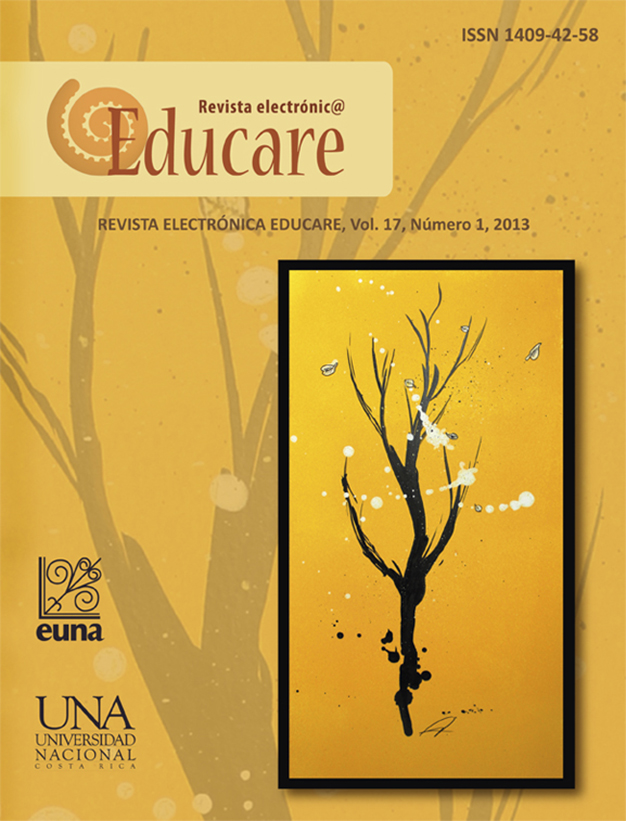Notes on School Writing as a Truth Effect on the Subject or as a Gesture in the Subject’s Relation to Knowledge
DOI:
https://doi.org/10.15359/ree.17-1.7Keywords:
Subjectivity, writing, knowledge, Educare Electronic Journal, Costa Rica.Abstract
This paper discusses ethical and philosophical assumptions on how the writings of students are seen in the education context, in terms of subjectivity and knowledge. Foucault’s concept of power is associated to writing as a “truth-effect” on the subject and to the reified concept of the subject’s writing, understood this as a mirror surface of thought. This stands in contrast to the spacing between the self and the sign implied in writing; spacing where subjectivity emerges, according to Derrida, in the sense produced by the difference. The conclusion suggests seeing writing as a gesture along the lines proposed by Agamben, because by overcoming the means-ends logic, the gesture becomes evident in the writing as a communication of communicability and of the pure power of thinking, i.e. an event. If, when writing, students are called to produce sense not only on a “specific” area of knowledge, but about their own selves within language as historical and desiring subjects, writing is assumed as a gesture toward knowledge, emerging therefore the ethical-political dimension on how we understand, evaluate and respond to students’ writings.
References
Agamben, G. (2001). Medios sin fin. Notas sobre la política. Valencia, España: Pre-textos.
Agamben, G. (2004). Estado de excepción. Buenos Aires: Adriana Hidalgo.
Agamben, G. (2005). Profanaciones. Buenos Aires: Adriana Hidalgo.
Charlot, B. (2008). La relación con el saber, formación de maestros y profesores, educación y
globalización. Cuestiones parala educación de hoy. Montevideo: Trilce.
Cullen, C. A. (1997). Críticas de las razones de educar. Temas e filosofía de la educación. Buenos
Aires: Paidós.
Derrida, J. (1998). De la gramatología (Trad O. Del Barco y C. Ceretti). México: Siglo XXI.
Di Benedetto, S. B. y Carlino, P. (2007). Correcciones a exámenes escritos en la universidad: cómo
son y para qué sirven a los alumnos. En Memorias de las XIV jornadas de investigación
en psicología y tercer encuentro de investigadores en psicología del Mercosur (Tomo I,
pp. 273-275). Buenos Aires: Facultad de Psicología de la Universidad de Buenos Aires.
Recuperado de http://www.fvet.uba.ar/postgrado/especialidad/blb/Di_Benedetto_
Carlino_Correcciones_examenes_escritos_07.pdf
Diment, E. y Carlino, P. (2006). Perspectivas de alumnos y docentes sobre la escritura en los
primeros años de universidad. Un estudio exploratorio. En Memorias de las XIII jornadas
de investigación en psicología y segundo encuentro de investigadores en psicología del
Mercosur. “Paradigmas, métodos y técnicas” (Tomo I, pp. 202-204). Buenos Aires: Facultad de Psicología de la Universidad de Buenos Aires. Recuperado de http://www.fapyd.
unr.edu.ar/academica/archivos/seminario_formacion_docente/10_diment_y_carlino__
perspectivas_de_alumnos.pdf
Duras, M. (1994). Escribir. Barcelona: Tusquets.
Fernández, G. y Carlino, P. (2006). Leer y escribir en la escuela media y en la universidad. Diferencias
percibidas por ingresantes a la Facultad de Ciencias Humanas de la UNCPBA. En Memorias
de las XIII jornadas de investigación en psicología y segundo encuentro de investigadores en
psicología del Mercosur “Paradigmas, Métodos y Técnicas (Tomo I, pp. 227-229. Buenos
Aires: Facultad de Psicología de la Universidad de Buenos Aires. Recuperado de http://
www.fvet.uba.ar/postgrado/especialidad/blb/Fernandez_y_Carlino_Leer_y_escribir_en_
la_esc_media_y_en_la_universidad_diferencias_Psico_06.pdf
Fontaine, A. (1995). La implantación del significante en el cuerpo. Revista Litoral, 18/19, 9-34.
Foucault, M. (1992). Microfísica del poder. Madrid: La Piqueta.
Habermas, J. (1994). Conocimiento e interés. En J. Habermas (Ed.), Ciencia y técnica como
“ideología” (pp. 159-181). Madrid: Editorial Tecnos.
Honneth, A. (2007). Reificación. Un estudio en la teoría del reconocimiento. Buenos Aires: Katz.
Lacan, J. (1997). El seminario. Libro 3. Las psicosis 1955-1956. Buenos Aires: Paidós, 1997.
Merleau-Ponty, M. (1973). The Prose of the World [La prosa del mundo]. Evanston: Northwestern
University Press.
Ong, W. J. (1997). Oralidad y escritura. Tecnologías de la palabra. México: Fondo de Cultura
Económica.
Pavese, C. (1976). El oficio de vivir. Buenos Aires: Siglo Veinte Editores.
Truffaut, F. (Director). (1959). Les Quatre Cents Coups (Les 400 coups) [Los cuatrocientos golpes].
[Film]. París: Les Films du Carrosse.
Tyler, R. W. (1949). Basic Principles of Curriculum and Instruction. [Principios básicos del currículum
y la enseñanza] Chicago: The University of Chicago Press.
Downloads
Published
How to Cite
Issue
Section
License
1. In case the submitted paper is accepted for publication, the author(s) FREELY, COSTLESS, EXCLUSIVELY AND FOR AN INDEFINITE TERM transfer copyrights and patrimonial rights to Universidad Nacional (UNA, Costa Rica). For more details check the Originality Statement and Copyright Transfer Agreement
2. REUTILIZATION RIGHTS: UNA authorizes authors to use, for any purpose (among them selfarchiving or autoarchiving) and to publish in the Internet in any electronic site, the paper´'s final version, both approved and published (post print), as long as it is done with a non commercial purpose, does not generate derivates without previous consentment and recognizes both publisher's name and authorship.
3. The submission and possible publication of the paper in the Educare Electronic Journal is ruled by the Journal’s editorial policies, the institutional rules of Universidad Nacional and the laws of the Republic of Costa Rica. Additionally, any possible difference of opinion or future dispute shall be settled in accordance with the mechanisms of Alternative Dispute Resolution and the Costa Rican Jurisdiction.
4. In all cases, it is understood that the opinions issued are those of the authors and do not necessarily reflect the position and opinion of Educare, CIDE or Universidad Nacional, Costa Rica. It is also understood that, in the exercise of academic freedom, the authors have carried out a rogorous scientific-academic process of research, reflection and argumentation thar lays within the thematic scope of interest of the Journal.
5. The papers published by Educare Electronic Journal use a Creative Commons License:















 The articles published by Educare Electronic Journal can be shared with a Creative Commons License:
The articles published by Educare Electronic Journal can be shared with a Creative Commons License: 



